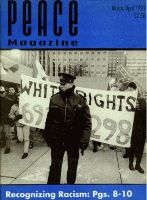
Peace Magazine Mar-Apr 1993, page 30. Some rights reserved.
Search for other articles by Metta Spencer here
Another Referendum? Vote in our unique weighted system
In previous issues of the magazine we began an experiment with a new form of decision-making using "direct democracy" instead of representative democracy. That is, we want to experience the use of referendums by all the members of the group.
One objective was to form constituencies that are not defined territorially (e.g. by province or riding) but instead on the basis of voluntarily chosen group identities that may change over time. These identities could represent, say, ethnic or gender groups or other interest groups, such as environmentalists or peace activists. Every such constituency (small or large) should be able to put its issue on the public agenda. In this system, a minority may even win-at least when the majority has no objections. Accordingly, the participants in this experiment formed the following constituencies: anglophones, Asians, Catholics, environmentalists, females, feminists, males, peace activists, and students. Each constituency generated two propositions to include on the referendum, and at a subsequent step, narrowed its choice to one such proposition per constituency. This time you will have a chance to vote on this referendum.
PLEASE READ THE FOLLOWING INSTRUCTIONS BEFORE VOTING.
Each voter may use one ballot. (If your friends want to vote, you can photocopy a ballot from each of them to use.) There are nine issues before you, so you may cast a total of nine votes. However, in this referendum you can "spend" your nine votes as you please to register the intensity, as well as the direction, of your opinion. If you are indifferent to certain issues, you may skip over them and save those votes to spend on the issues about which you do have strong opinions. If, for example, you do not vote on propositions 3, 5 and 7, you save up three votes. You may then cast four votes for or against, say, proposition 6, if that is the issue that interests you most. In fact, you are allowed to cast all 9 of your votes on one single proposition, if you are willing to skip all eight of the other propositions. Or, if you care equally about all these issues, you may cast one vote on each of them, in the conventional manner of voting.
NOW VOTE.
In the spaces opposite, indicate the number of votes in favor or against each item.
Yes __No
1. Canada shall increase support for sustainable development at home and around the world.
Yes __No
2. Tobacco may not be sold in Canada nor smoked in public places.
Yes __No
3. The young offenders act shall be repealed and stronger penalties shall be imposed on juveniles who commit crimes.
Yes __No
4. Manufacturers must immediately cease using chlorofluorocarbons in Canada.
Yes __No
5. Women who wish to care for their own children at home may receive a subsidy so they can do so instead of working for pay elsewhere.
Yes __No
6. The principle of "equal pay for work of equal value" shall be enforced for all jobs in firms with 10 or more employees.
Yes __No
7. The use of marijuana and other psychotropic drugs shall be legal in Canada. Those who are addicted to narcotics shall be given doses under close medical supervision.
Yes __No
8. Arms shall not be exported to any country that is known to have threatened human rights within the preceding three years.
Yes __No
9. The quality of Canadian universities shall be improved and grants and loans provided to low-income students in all postsecondary institutions.
Total number of votes you have cast (not to exceed nine)
Next time, I will present the results of this referendum and explain why this system may be useful and important. Please mail your ballot to Peace Magazine, 736 Bathurst Street, Toronto M5S 2R4 by April 5. Thanks for your cooperation!

Peace Magazine Mar-Apr 1993, page 30. Some rights reserved.
Search for other articles by Metta Spencer here